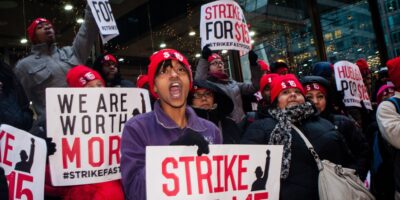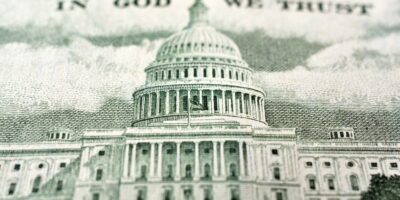In Defense of Share Buybacks
In this week’s Big Read at the Financial Times, well-known columnist Martin Wolf provides a shotgun-style summary of common objections to 21st-century capitalism. His 2,000-word condemnation of what he calls “Rentier Capitalism” includes almost every popular denouncement of capitalism of recent years and points to all the ways in which the modern world has supposedly let us down.
Most of them are tired clichés and hyperbolic tirades of doubtful accuracy: the unprecedented danger posed to civilized society that is tax havens; the mirage of ever-increasing market concentrations; and of course the perils of wage inequality, without which no condemnation of the era following the great financial crisis would be complete. Not only are financial services in general a parasitic drag on the economy (he literally uses the words “useless” and “unproductive” to describe the financial sector), but their appeal to talented people amounts to an unforgivable brain drain that explains the below-average productivity growth observed in modern Western economies.
Wolf, pouring old wine in new bottles, makes objections as old as economics itself. Even classical economists used to refer to rent extraction — an unfair gain of material resources from the fruits of capitalist development over what would have been required to induce individuals to bring them forth — as “unearned income” with the accompanying moralistic language.
While Wolf mentions some of the well-studied and conventional reasons why the 21st century has seen some of the trends he laments (globalization and superstar effects, the race between technology and education; network effects) he does not advance any reason to doubt those essentially descriptive explanations.
Instead, Wolf resorts to grand, utopian, and moralistic language. He would have us replace “a capitalism rigged to favour a small elite” with one “that gives everybody a justified belief that they can share in the benefits.” Remaining mysteries are who those people doing the rigging really are and why we can’t find the smoking gun of actually “rigging” the economy. In vain I have searched for both.
Especially prominent in Wolf’s text is the differences in earnings between workers and senior management. A particular evil, argues Wolf, is the practice of tying CEO remuneration to share prices, long seen as a successful solution to the principal–agent problem between shareholders and managers. In direct opposition to this Nobel Prize–winning insight, Wolf joins a jolly crowd of dissenters that, among others, includes Matt Yglesias, Paul Krugman, Bernie Sanders, Joe Biden, the occasional Economist editorial, and my modestly conspiratorial economics lecturer at University of Glasgow.
Even some market-friendly analysts have argued this point: share-price remuneration creates perverse incentives for managers who’d rather focus on increasing their company’s share price than making truly productive and beneficial investments for their companies. Runaway stock markets are not, mind you, outcomes of money printing, endless rounds of quantitative easing, or any other postcrisis central bank behavior, but due to senior management’s rent-seeking practice of taking up cheap debt to buy back shares in their own company. Let’s explore that a bit more.
Look Further
What all economists must do is work through not only the primary effects of some event, but secondary and often third-order outcomes as well.
As an example, take “job creation” programs, lauded by almost all politicians. By only looking at the number of new jobs in such programs without considering the jobs destroyed by their funding or implementation, you are vastly overstating their real effect. As Bastiat taught us in his famous broken window fallacy, we must ask: what is given up elsewhere so that a desired policy can be realized?
By objecting to share buybacks, Wolf makes such a fallacious argument. His mistake lies in not looking beneath the surface.
What Happens When Companies Buy Back Their Own Shares?
Economics teaches us to think through problems wholly. Rather than accepting naive explanations that quickly come to mind or seem obvious on the surface, economic analysis delves deeper. In opaque and complicated financial systems like ours, a seemingly simple transaction can include countless more, blurring the assessments of what is going on.
With profits (or indeed newly issued debt), companies may buy and retire their own outstanding stock, authorized and managed by senior management whose salaries and bonuses are strictly tied to the company’s stock price. This, of course, looms large in the eyes of left-leaning critics. Share buybacks benefit “shareholders and corporate leadership” rather than their workers, argue Bernie Sanders and Chuck Schumer. Similarly, both Yglesias and Wolf seem to think that management is passing over productive investments and that buybacks add no value, effectively short-changing not only workers but ultimately owners as well, enriching only management.
What share buybacks do is intentionally reduce the outstanding capital of one’s own company. The managers are putting cash behind their conviction that owners can make better use of spare funds than the company can. As Erica York persuasively explains, companies buy back shares when they have “more cash than investment opportunities.”
It may be that the company has enough cash to sustain its current and future operations and is therefore in no need of the extra money. Another possibility is that a company — as most on the left call for governments to do — is taking advantage of low and even negative interest rates, in effect locking in cheap funding for the foreseeable future. When equity is expensive and debt is cheap and plentiful, prudent management should swap one for the other since dividend payments for shareholders come out of corporations’ positive free cash flows anyway. Even if there is something wrong with our extraordinarily low interest rates, it makes perfect sense for long-term business to take advantage of what looks like temporarily cheap funding.
Notice how Wolf’s sleight of hand undermines his argument. He says that share buybacks do not add value to “the company” with the implication that they don’t add value to the economy. The seller — the counterparty to the actual buyback transaction by the company — can either use the proceeds to buy another financial investment or consume them in the real economy. Below we’ll see how that benefits the economy.
Adding Value to the Economy
Monetary economics makes perfectly clear that money spent always goes somewhere. In this case, corporations buying back their own shares transfer funds to sellers of those shares — the funds do not “vaporize.” Wolf and others stop their assessment here and conclude that managers are transferring funds to shareholders in addition to enriching remaining shareholders when the stock price increases.
There are two reasons why the share price ought to rise: First, upon canceling some of the outstanding shares, every remaining share now represents a larger piece of the overall company. As this transaction didn’t change anything about the company’s underlying operations, every share should now be slightly more valuable. Second, if management successfully replaced expensive equity with cheap debt, the company’s effective cost of capital has fallen — making the shares more profitable investments, all things equal (in jargon, while net income falls due to higher interest rate expenses, the return on equity increases as the fewer shares outstanding more than offset the reduction in net income). This is value creation for the company’s shareholders as well as releasing funds for financial markets to profitably invest elsewhere.
Wolf’s failure to look past these initial effects detracts from his argument. A seller of stock now has funds at his disposal for which he has four actions available to him:
- Remain liquid, and so effectively provide reserves to his bank or broker that are used for loans elsewhere or pile up as excess reserves at the Fed.
- Buy another security on the secondary market.
- Invest the funds in an initial public offering (IPO), transferring his funds to a new and thriving business in need of funds.
- Remove the funds from the financial system and consume them.
If the seller remains liquid (1) or buys another security (2), he merely pushes the decision to another person faced with the exact same options. If he invests the funds in an IPO (3), the new company invests the proceeds in its operations. If he spends the proceeds in the real economy (4), they show up as somebody else’s income, add to GDP, and send market signals to entrepreneurs elsewhere in the economy to pivot some investment into these lines of production. However long this round of hot potato is, at the end there is a real transaction.
The financial system is beautiful in that a dozen or more internal transactions, through various routes, ultimately have the same outcome: funds are moved from places where they may not earn very much to where they might. In the share-buyback example that Wolf and others lament, idle cash is moved from a corporation that sees no need for it (or a bank reserve earning interest of excess reserves at the Fed) to fueling startups that do. Share buybacks do not, as Wolf seems to believe, occur “at the expense of corporate investment and so of long-run productivity growth” — that investment just takes place elsewhere.
The hypothetical company’s share buyback merely pushed the decision of what to do with the money to the next person in line — transferred the purchasing power from the company itself to somebody seeing more investment opportunities elsewhere.
It is perfectly possible that nobody in the economy sees any productive investments to make and so share buybacks would ultimately just end up in consumption. That might be a worrying sign and a real instance of secular stagnation. That’s not the argument Wolf makes.
Even if it were, his calls for reinvesting in the company or its workers are misguided. Spending money on new investments that the managers themselves don’t think will pay off seems like a surefire way to perpetuate such dismal productivity growth. If nobody in the entire economy can find profitable investments to make, companies naturally ought to liquidate their holdings and give assets back to their owners for consumption — which is precisely what share buybacks accomplish!
The confused objections to share buybacks illustrate the failure to look past the immediate effect and to understand what financial markets do. In a decentralized way, reacting and incorporating the best available information, they transfer funds from those with money but no ideas to those with ideas but lacking money. Financial markets efficiently allocate capital across the economy, but do so in roundabout ways that are easy to miss.
Looking past the immediate effect allows us to see the bigger picture: share buybacks are one cog in a well-functioning financial system, doing precisely what they are supposed to do. That’s a good thing — not something to lament.











